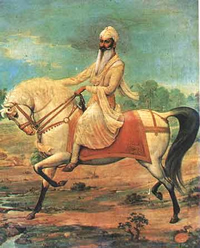 |
Satguru
Ram Singh Sardar Sobha Singh |
The belief that the line of personal Gurus ended with the death of Guru Gobind Singh is denied by the Namdhari Sikhs, who insist that the tenth Guru lived for many years after 1708 CE, eventually bestowing the succession on Guru Balak Singh (1797-1862). A puritan who stressed the importance of Nam—the divine name—for salvation and drew most of his followers from the poorer classes, Balak Singh began the movement in the north-west Panjab. However, it was the second Namdhari Guru, Satguru Ram Singh (1816-85 CE), who would have the greatest impact, and Namdharis observe the anniversary of his birth during the festival of Basant.
Namdhari Sikhs played a prominent role in the freedom movement of India. During the early days of British rule in the Punjab they organised themselves into a well-knit group of soldiers and offered tough resistance to the foreign rule. It was Ram Singh who first sowed the seeds of nationalism and patriotism in his countrymen, an example later emulated by Mahatma Gandhi. He formally founded the Namdhari Panth (community of believers) on Baisakhi 1857 by raising a white flag, symbol of truth, purity and peace. He was exiled to Burma by the British in 1872.
In Guru Ram Singh’s time, infanticide of girls was commonplace, as was their sale into servitude, pernicious practices that were caused mainly by the enormous financial burden of marriage expenses. Ram Singh placed an emphasis on the education of both boys and girls; in addition he introduced a dowry-free system of mass marriages known as anand kaaraj in an effort to stamp out the practice of infanticide and increase the respect and status of women in society.
Namdhari Sikhs are easily recognized by their practice of wearing white homespun clothing and by the method they use of tying the turban horizontally across the forehead. Their distinctive rituals include the fire ceremony, or havan, and the practice of cirumumbulating a fire during the course of the wedding ceremony. Another distinguishing mark of their faith is the fundamental and unshakeable belief in the living Guru. Because of the shrieks (kuks) they utter during ecstatic meditative trances, they are also known as Kukas. The fundamental core of their religious life is Nam Simran—meditation on the name of God; the word Namdhari translated literally means ‘one who has adopted God’s name’.